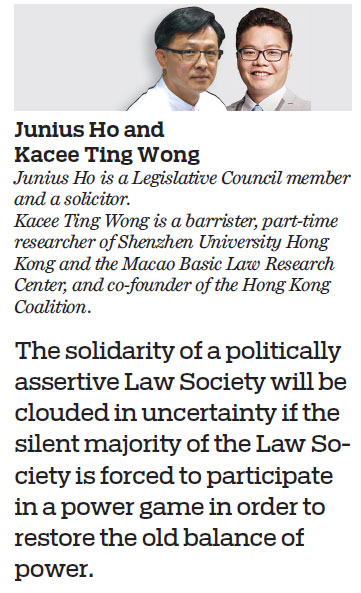A politicized Law Society serves no one's interest
By Junius Ho, Kacee Ting Wong | HK EDITION | Updated: 2021-08-17 08:43

The Law Society's forthcoming council election has sparked a surge in concerns about the risk that its right to regulate its own affairs will be at stake if the liberal faction wins the election and turns it into a disruptive political society. It is an underappreciated fact that an independent legal profession brings as much benefits to the public as to the profession. Maintaining an independent and self-regulatory status enables the Law Society to play a more active role in safeguarding the rule of law by operating and speaking without fear of executive interference.
Martin Partington, a British legal scholar, argues that an independent legal profession protects lawyers from pressure to self-censor their advocacy on behalf of claims which the state or even a majority may find disagreeable or distasteful yet may be just, thus promoting the rule of law and the constitutional principle of equal justice under law. In his farewell speech in June 2010, the former chief justice Andrew Li Kwok-nang emphasized that a competent and independent legal profession was of crucial importance to the functioning of an independent judiciary.
There are three reasons why the guard against the danger of the politicization of the Law Society should not be relaxed. First, the high probability that the council election on Aug 24 will tilt the balance of power in the council in favor of the liberal faction has not escaped the attention of the People's Daily. In a recent commentary, the publication urged Hong Kong's lawyers to engage in professionalism and not politics. Quoting the former chairwoman of the Bar Association, Winnie Tam Wan-chi, it also urged the Law Society to avoid following in the footsteps of the Hong Kong Bar Association and becoming a politicized body. We cannot turn a blind eye to the fact that a politicized Bar Association has poisoned its relations with the central government. At no time and under no circumstances should the concerns of the People's Daily be neglected.
Second, a politically assertive Law Society may adversely affect the relations between the Hong Kong Special Administrative Region government and the Law Society. A deep concern has been expressed over the conduct of an outspoken liberal candidate. It is alleged that Selma Masood, one of the candidates in the liberal faction, promoted hatred against the Hong Kong Police Force during an interview with the US-based Norfolk Daily News in December 2019. Her comments focused on unsubstantiated reports that the police acted brutally during the anti-government protests. She also accused the Hong Kong government of posing a threat to the rule of law in Hong Kong, which she said triggered the social unrest in the summer of 2019. Last year, a liberal grouping won four out of five available seats in the council election. Equally worrying was their call for police accountability over what they called "problematic incidents" arising from the social unrest in the second half of 2019.
It remains to be seen whether the Hong Kong government will adopt drastic measures to respond to the birth of a politically assertive Law Society dominated by a radically liberal faction. In politics, perception is reality. It is highly likely that the Hong Kong government will regard the radically liberal faction as a disruptive force in the territory because of the faction's agenda and past conduct. Strong mistrust of a politicized Law Society will create an incentive for the Hong Kong government to consider putting an end to the self-regulatory status of the Law Society.
Likewise, the central government may reconsider maintaining harmonious and cordial relations with the Law Society. In addition to exerting a negative effect on the exploration of new business opportunities in prosperous mainland cities, any disruption to the normal relations between the Law Society and the mainland authorities will have an adverse effect on the joint ventures between local lawyers and mainland lawyers. Cooperation in dealing with cross-border legal disputes will also be affected.
Finally, the solidarity of a politically assertive Law Society will be clouded in uncertainty if the silent majority of the Law Society is forced to participate in a power game in order to restore the old balance of power. In the second half of 2019, the Law Society, a key upholder of the rule of law in Hong Kong, issued various public statements to condemn violence arising from the anti-government protests. It condemned violence in Central and Admiralty on June 12, the violent siege of the Legislative Council building on July 1, the open defiance of court orders by paralyzing access to Hong Kong International Airport, blocking roads and vandalizing public transport and railway stations on Sept 1 and the throwing of petrol bombs at court buildings on Dec 8. These pro-rule-of-law statements would not have been issued if the liberal faction had dominated the council of the Law Society. The two camps would have pointed accusing fingers at each other.
Before the handover, the Law Society was extremely sensitive to any sign that its independence would be under attack by the new government in the post-handover period. Probably because of complacency, the above sensitivities seem to have disappeared from the radar screen in the past few decades. To maintain its hard-won self-regulatory status, the Law Society should not engage in politics. Members of the Law Society should support Careen Wong Hau-yan, Tom Fu Ka-min, Ronald Sum Kwan-ngai, Justin Yuen Hoi-ying and Jimmy Chan Kwok-ho in the forthcoming council election. Only a professional Law Society can perform its sacred duty to safeguard the rule of law in Hong Kong.
The views do not necessarily reflect those of China Daily.

























